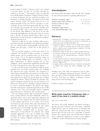December 2022 in “Archives of Dermatological Research” Adding cetirizine to minoxidil improves hair growth and thickness in women with androgenetic alopecia.
 76 citations,
June 2008 in “Journal of the American Academy of Dermatology”
76 citations,
June 2008 in “Journal of the American Academy of Dermatology” The conclusion is that certain scalp tissue changes are characteristic of lichen planopilaris, with mucinous perifollicular fibroplasia being a new feature for diagnosis.
 34 citations,
July 2011 in “Journal of Dermatological Treatment”
34 citations,
July 2011 in “Journal of Dermatological Treatment” Curcuma aeruginosa extract combined with minoxidil effectively treats male-pattern baldness.
 4 citations,
June 2002 in “Clinical and experimental dermatology”
4 citations,
June 2002 in “Clinical and experimental dermatology” Effective treatment for hidradenitis suppurativa varies, with antibiotics commonly used and surgery as an option, but no single method is universally successful.
 8 citations,
June 2022 in “Cosmetics”
8 citations,
June 2022 in “Cosmetics” Coffee berry extract may help slow skin aging and prevent hair loss.
 October 2024 in “Cosmoderma”
October 2024 in “Cosmoderma” Proper hair care and suitable products are essential for men's scalp health and well-being.
7 citations,
September 2020 in “Bioscience Biotechnology and Biochemistry” The scalp has more diverse bacteria, while hair has more bacteria and unique types.
 July 2023 in “Clinical, cosmetic and investigational dermatology”
July 2023 in “Clinical, cosmetic and investigational dermatology” Plica neuropathica can be a sign of schizophrenia and improves with antipsychotic treatment.
 17 citations,
January 2020 in “Skin appendage disorders”
17 citations,
January 2020 in “Skin appendage disorders” Certain diets may help with hair growth in people with different types of hair loss.
 14 citations,
January 2020 in “Skin appendage disorders”
14 citations,
January 2020 in “Skin appendage disorders” A shampoo with cannabidiol can significantly reduce scalp inflammation and symptoms in people with mild to moderate psoriasis or seborrheic dermatitis.
 8 citations,
April 2015 in “British Journal of Dermatology”
8 citations,
April 2015 in “British Journal of Dermatology” White piedra, a rare fungal infection, was diagnosed in two women in a northern climate.
 July 2022 in “International Journal of Trichology”
July 2022 in “International Journal of Trichology” Tofacitinib helped an 8-year-old child recover from a type of hair loss that is hard to treat.
99 citations,
July 2005 in “Ultramicroscopy” The research improved understanding of hair and skin properties across different ethnicities and conditions.
 May 2024 in “Microbial Biosystems Journal”
May 2024 in “Microbial Biosystems Journal” Herbal shampoos are as effective and safer than synthetic antifungal shampoos for treating Seborrheic dermatitis.
June 2020 in “Authorea (Authorea)” First-time mothers had higher stress hormone levels in late pregnancy than mothers who had given birth before.
 14 citations,
May 2019 in “Journal of Maxillofacial and Oral Surgery”
14 citations,
May 2019 in “Journal of Maxillofacial and Oral Surgery” FUE hair transplant is a promising method with benefits like less scarring, but requires a skilled surgeon and can damage hair follicles.
 1 citations,
October 2021 in “Journal of the European Academy of Dermatology and Venereology”
1 citations,
October 2021 in “Journal of the European Academy of Dermatology and Venereology” The hair lotion reduced hair loss and sped up recovery in women with acute telogen effluvium.
February 2025 in “Journal of Investigative Dermatology” DMG-Na may help reduce hair loss and improve hair growth, but more research is needed.
Hair Botox makes hair look healthier and fuller.
February 2025 in “Journal of Cosmetic Dermatology” Patch testing is crucial to reduce allergic reactions in hair loss treatments.
 June 2023 in “Research journal of topical and cosmetic sciences”
June 2023 in “Research journal of topical and cosmetic sciences” The polyherbal lotus oil with amla, hibiscus, bhringraj, and methi promotes hair growth effectively, similar to minoxidil.
 January 2022 in “Journal of Skin and Stem Cell”
January 2022 in “Journal of Skin and Stem Cell” Trichodynia is a painful scalp condition needing targeted treatments beyond symptom management.
 January 2019 in “Clinical Dermatology Open Access Journal”
January 2019 in “Clinical Dermatology Open Access Journal” Combining corticosteroids and non-ablative fractional laser therapy may effectively treat extensive alopecia areata.

Proretinal nanoparticles are a safe and effective way to deliver retinal to the skin.
January 2022 in “Aesthetic surgery journal” Extracellular vesicles may effectively treat hair loss with minimal side effects.
16 citations,
October 2021 in “Trends in biotechnology” Future hair products will use ecofriendly proteins and peptides to improve hair health and appearance.
April 2024 in “Cosmetics” Wigs help improve self-esteem and quality of life for people with hair loss from alopecia areata.
 October 2020 in “Veterinary Dermatology”
October 2020 in “Veterinary Dermatology” New treatments and diagnostic methods for various animal skin conditions showed promising results.
 16 citations,
April 2011 in “Journal of The American Academy of Dermatology”
16 citations,
April 2011 in “Journal of The American Academy of Dermatology” Dermatologists play a key role in identifying and documenting signs of abuse and injury for forensic investigations.
124 citations,
January 1995 in “The journal of allergy and clinical immunology/Journal of allergy and clinical immunology/The journal of allergy and clinical immunology” Netherton's syndrome is linked to high IgE levels and unique skin and hair symptoms, and may improve with ammonium lactate lotion and allergy management.


















